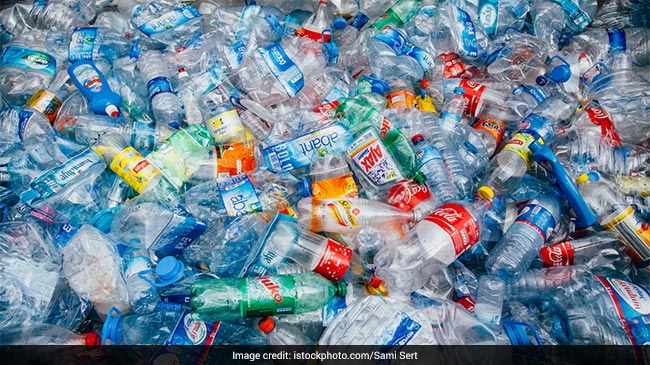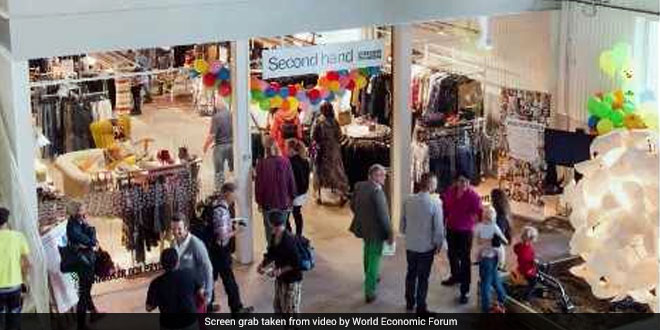Highlights
- Plastic takes around 500 to 1000 years to degrade
- India produces 15,000 tonnes of plastic waste daily
- 9,000 tonnes of plastic waste in India remain untreated
Have you ever wondered what happens to the plastic bags, spoons, pet bottles and other such products which you use and discard almost on a daily basis? No, right? Plastic is a product that takes around 500 to 1000 years to completely degrade due to the presence of complex polymers. This means that every bit of plastic manufactured or used by us till date still exists somewhere on the planet.
Here is how different countries are coping up with their plastic woes-
1. Make Way For Uganda’s Plastic House
Meet Mirro David from Kampala, Uganda, who is building houses using plastic bottles which not only solve the problem of waste but housing issue as well. People dump bottles anywhere and when it rains, all the bottles end up in trenches leading to flood. Mirro wanted a solution to this problem and then he came up with this idea. Construction of houses starts with the process of filling plastic bottles with soil. This not only reuses plastic bottles but also saves environment. These houses are cost effective too as the materials used are readily available. Miiro is spreading his idea to refugee camps and also teaching marginalised youth how to use bottles to build houses.
We educated them, we moved house to house, room to room, educating them how they can easily protect the environment and how they can easily use the available resources to construct their houses. We just think that we need to get solutions from different people, yet the solutions are just next to us, said Mirro David in an interview to AJ+, a global news community.
2. Go To Sea In A Plastic Bottle Boat
Instead of clogging up local waterways, discarded bottles now ferry people instead of traditional boats made of wood, steel, aluminum. The students in Cameroon are turning discarded plastic bottles into boats. Plastic bottle boats are strong and seaworthy and now they are a key part of the fishing fleet. These boats not only help the environment but fishermen also.
So are you ready to sail off on a plastic bottle boat?
Also Read: Plastic Ban: What India Can Learn From Other Countries
3. Recycled 3-D Sunglasses
A Belgium based start-up has taken the plastic management game a step higher by printing 3D sunglasses out of recycled plastic. The plastic waste is fed into the 3-D printer, melted to form thin strands of plastic wire and then used for the construction of frames. Later, frames are fitted with Italian lenses. The company also urges people to return the glasses once these are used so that it can be recycled into a new pair of glasses. Not only this, to make people use these glasses, company has come up with five unique designs and three different colors of lenses.
Would you wear these shades to ease the burden of plastic?
4. ReTuna, A Hub Of Recycled Products-
Sweden is already known as one of the world’s best recycling nations and now it has added a feather in its cap by opening an upcycling shopping mall called ReTuna. ReTuna works on the formula of environment friendly products and sells only repaired or upcycled products. The staff repairs the items dropped by people for restoring and then sell it in the mall. The mall has created 50 jobs and contains a training college for studying recycling. It also has a restaurant, conference facilities and a retail space for local entrepreneurs and artisans.
5. Walk And Ride On Plastic In Scotland
A Scotland based company called MacRebur came up with a way to create roads using recycled plastic which are stronger and durable than roads built using asphalt. Asphalt-based roads crack during rains and don’t last long. Plastic roads are 60% stronger and last around 10 times longer. Along with this it is also solves the problem of growing plastic pollution. The roads are made with a material that MacRebur calls MR6. The MR6 gets mixed with other contruction materials and replaces the need for a wasteful material called bitumen.
India will soon drown in its own garbage as it is among the top 10 countries generating the highest amount of municipal solid waste. About 15,000 tonnes of plastic waste is produced in India daily, of which about 9,000 tonnes is recycled. The remaining waste clutters landfills and clogs drains. India can probably take a lesson or two from how these other countries are tackling their plastic waste.
Also Read: 5 Cool Waste Management Ideas From The World That India Can Adopt




































Shikha
October 31, 2017 at 7:29 pm
Plastic litter affects almost all the countries in the world, leading to demands from politicians and environmentalists to ban or tax plastic bags. There is no longer any need for this because when d2w® is included at the manufacturing stage of production, it converts everyday plastic products (made from PE, PP or PS) into materials which are biodegradable in the open environment, in the same way as a leaf only quicker, and leaving nothing behind – no toxic residues or fragments of plastic.
d2w® oxo-biodegradable (controlled-life) plastic additive is the only product of this type to be awarded an internationally-recognised eco-label.
Single use plastic bags use less energy and other resources, are less expensive, better for public health and result in fewer negative environmental impacts than alternative shopping bags.
Plastic is the most effective material ever invented for protecting our food and other goods from damage and contamination.
Don’t ban it, just add d2w.
Michael
August 1, 2018 at 4:16 am
Oh wow how cool. I hope you all burn